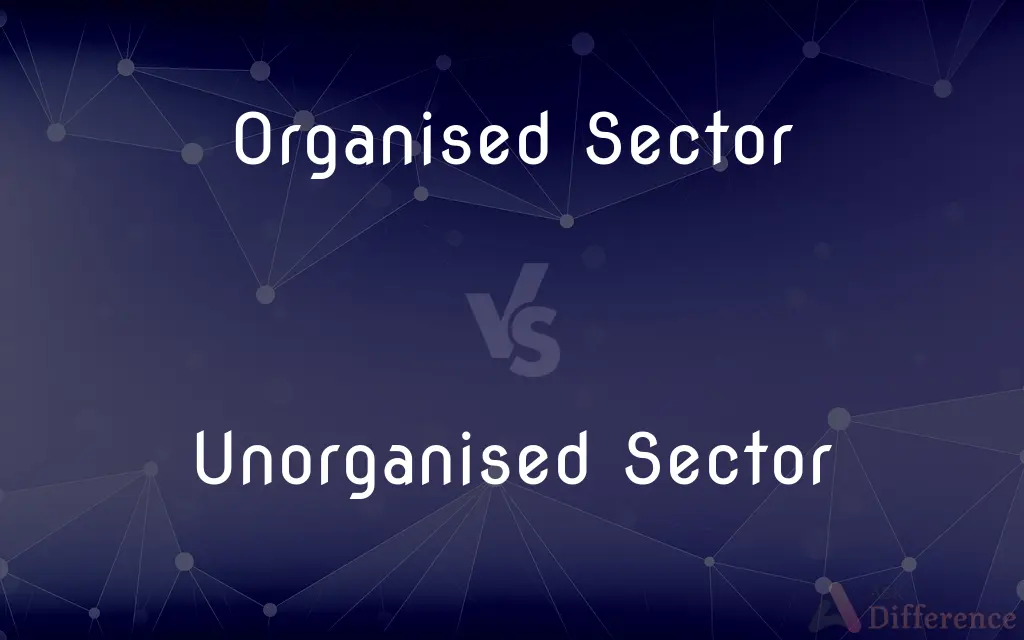Organised Sector vs. Unorganised Sector — What's the Difference?
Edited by Tayyaba Rehman — By Fiza Rafique — Published on December 18, 2023
The Organised Sector encompasses businesses that are regulated and registered, providing formal employment. The Unorganised Sector includes small, unregistered entities and informal employment.

Difference Between Organised Sector and Unorganised Sector
Table of Contents
ADVERTISEMENT
Key Differences
The Organised Sector refers to that part of the economy where activities are carried out by established and recognized entities. Within the Organised Sector, businesses adhere to government regulations, maintain official records, and often provide benefits to employees. The Unorganised Sector, on the contrary, encompasses operations that might not strictly follow the rule of law, are smaller in scale, and lack formal records or registration.
Employment in the Organised Sector typically offers better job security, wages, and additional perks, such as pensions or health insurance. Employees here receive a fixed salary and work under defined conditions, safeguarded by labor laws. In contrast, the Unorganised Sector doesn't provide the same level of job security or benefits. Wages in the Unorganised Sector can be inconsistent, and workers might not be protected by employment laws.
In terms of size and reach, the Organised Sector often comprises larger enterprises or corporations that have a significant market presence. They are usually more stable, have better access to resources, and contribute a larger share to the country's GDP. The Unorganised Sector predominantly consists of smaller entities, local vendors, or individual artisans, contributing in smaller amounts to the overall economy but essential for grassroots-level activities.
Financially, the Organised Sector is closely monitored by relevant authorities, with regular audits and mandatory tax payments. They maintain proper books of accounts and follow established financial practices. The Unorganised Sector, meanwhile, may not always maintain thorough financial records, leading to challenges in tracking economic contributions and ensuring tax compliance.
Both the Organised Sector and Unorganised Sector play crucial roles in an economy. While the Organised Sector brings in large-scale production, stability, and jobs, the Unorganised Sector supports local communities, fosters entrepreneurship, and provides livelihoods for a vast number of people.
ADVERTISEMENT
Comparison Chart
Regulation & Registration
Regulated and registered
Often unregistered and unregulated
Employment Benefits
Provides job security and benefits
Limited or no formal benefits
Size
Typically larger enterprises
Smaller entities or individual businesses
Financial Records
Maintains official financial records
May lack comprehensive financial documentation
Contribution to Economy
Significant GDP contribution
Essential at grassroots level, smaller GDP share
Compare with Definitions
Organised Sector
Enterprises that adhere to government laws and provide formal employment.
Benefits like health insurance are common perks in the Organised Sector.
Unorganised Sector
Businesses that may not maintain official financial or operational records.
Many artisans selling handicrafts belong to the Unorganised Sector.
Organised Sector
Part of the economy contributing significantly to national GDP and economic stability.
The growth of the Organised Sector indicates a strengthening economy.
Unorganised Sector
Entities that don't necessarily adhere to standard labor laws or provide job security.
Seasonal workers might find employment within the Unorganised Sector.
Organised Sector
Entities providing consistent wages and employee rights under labor laws.
Job security is one of the appealing aspects of the Organised Sector.
Unorganised Sector
Grassroots-level operations contributing to local economies but not always reflected in national GDP.
The Unorganised Sector sustains many rural communities.
Organised Sector
A regulated and registered part of the economy with structured operations.
Many large corporations fall within the Organised Sector.
Unorganised Sector
Economic activities without formal registration or regulation.
Local farmers often operate within the Unorganised Sector.
Organised Sector
The segment of the economy with official records and financial transparency.
The Organised Sector undergoes regular audits to ensure compliance.
Unorganised Sector
Segment of the economy providing informal employment and varying wages.
Street vendors are a vital part of the Unorganised Sector.
Common Curiosities
Are workers in the Organised Sector better protected?
Typically, the Organised Sector offers better job security and employee benefits due to adherence to labor laws.
Is the Unorganised Sector smaller in size?
The Unorganised Sector often consists of smaller businesses or individual vendors, but can be vast in number.
What defines the Organised Sector?
The Organised Sector is regulated, registered, and offers formal employment.
What kind of jobs can one expect in the Unorganised Sector?
Jobs in the Unorganised Sector can range from artisan work, farming, local vending, to seasonal labor.
How does the Unorganised Sector differ from the Organised Sector?
The Unorganised Sector includes unregistered entities, informal employment, and may lack comprehensive records.
Are regulations stricter for the Organised Sector?
Yes, the Organised Sector often faces stringent regulations and compliances compared to the Unorganised Sector.
Can the Unorganised Sector contribute significantly to the economy?
Absolutely, the Unorganised Sector, though fragmented, plays a crucial role, especially at the grassroots level.
Do Organised Sector companies pay more taxes?
Generally, the Organised Sector has a structured tax payment system, while the Unorganised Sector might have irregular tax compliance.
Is employment stability higher in the Organised Sector?
Yes, the Organised Sector usually offers more stable employment compared to the Unorganised Sector.
Is it easier to start a business in the Unorganised Sector?
Starting in the Unorganised Sector might have fewer bureaucratic hurdles, but it comes with its set of challenges.
Share Your Discovery

Previous Comparison
Markovnikov Rule vs. Anti Markovnikov Rule
Next Comparison
Inbound Marketing vs. Outbound MarketingAuthor Spotlight
Written by
Fiza RafiqueFiza Rafique is a skilled content writer at AskDifference.com, where she meticulously refines and enhances written pieces. Drawing from her vast editorial expertise, Fiza ensures clarity, accuracy, and precision in every article. Passionate about language, she continually seeks to elevate the quality of content for readers worldwide.
Edited by
Tayyaba RehmanTayyaba Rehman is a distinguished writer, currently serving as a primary contributor to askdifference.com. As a researcher in semantics and etymology, Tayyaba's passion for the complexity of languages and their distinctions has found a perfect home on the platform. Tayyaba delves into the intricacies of language, distinguishing between commonly confused words and phrases, thereby providing clarity for readers worldwide.














































